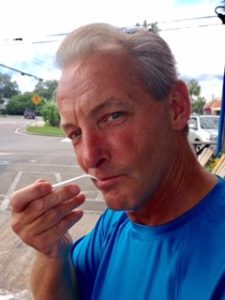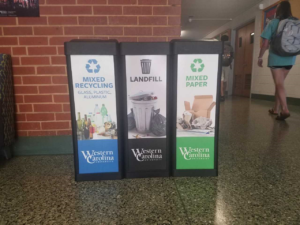
Jeff White, Western’s recycling coordinator. Photo by https://www.wcu.edu/discover/campus-services-and-operations/facilities-management/energy-management/contact.aspx
Jeff White, recycling coordinator at WCU tells the story of a single water bottle that’s washed away in roadside ditch and it ends up in the Tuckasegee river. From the Tuckasegee river, it floats through the Fontana Dam and into the Tennessee river. The water bottle makes its way to the Mississippi river and is picked up by the Gulf and ends up in the ocean.
“So, that one bottle makes a tremendous difference,” White said.
Plastics are a huge deal, but there’s more to recycling than just plastic.
Western’s first recycling program began in the 70s when the dining halls sent their food waste to hog farms. In 1998, the recycling program expanded to include aluminum, mixed paper, cardboard and metal.
Then, White became Western’s first recycling coordinator in 2016. Since his time at Western, he’s done many things to improve recycling on campus.
A three bin program was implemented in Killian and Stillwell. There are three bins, one is for mixed recycling which includes glass, aluminum and plastic. The second bin is strictly for mixed paper like newspapers, books , magazines, etc. The last bin is for landfill which can include food waste and wrappers, waxy paper, broken glass etc.

The three bin system located in various buildings, this one is specifically in Reid. Photo By Allyson Wainright
ES 495, Senior Research Seminar for Environmental Science students conducted a waste audit where they would sort through the trash in those two buildings and measure it to determine the waste stream at Western. Through the audit, they were able to see how much landfill, mixed recycling and mixed paper we had.
The findings were presented at the Energy Summit at Appalachian State University in 2016.
The three bin program is expanding to HFR, Belk, and Mckee. There are 90 bins for those buildings. “They’ve installed a little over 225 bins in the past two years, “White said.
The Office of Sustainability and Energy Management have to identify the best locations for the bins, place the order and deploy them. They pull out all trash cans in the classrooms. Then, we educate the departments in those buildings, Lauren Bishop, Chief Sustainability Officer said.
“It’s the same volume of waste, we just consolidate it to more centralized areas for them to be serviced by housekeeping,” Bishop said. “So hopefully the end goal, they can spend more time on improving services in other areas.”
It saves resources like trash can liners as well.
Recycling bins have also been added to the different sports venues to help capture more materials, White said. There’s even a Whee Recycle Tailgate Recycling program for home football games. The program is managed by interns and E.C.O Cats.
Cardboard is captured and bailed on campus and then, it’s sold to Jackson Paper in Sylva. Other types of waste like lightbulbs, batteries, tires, oil are recycled as well on campus.
The national rate of recycling is 34 percent and Western’s percentage is about 34 percent as well, White said. The national rate includes textile, rubber and other things that are not included in Western’s percentage.
White began first tracking recycling data in 2016 where the amount Western recycled was at 167 tons. Fast forward to the end of 2017/2018 and the amount was 285 tons, a 70 percent increase.
“So is that enough? Is that where I’d like to be?” White asked. “No, it’s not.”
So as the population grows, White sees the education aspect becoming a huge part of improving recycling. Also, expanding up the current recycling program even more and providing more of those bins.
Additionally, in the future, there may be some type of compost system at Western. White is currently looking into two different types of systems. One is vermiculture which is compost using worms. The other is in vessel compost system where there would be a contained metal box. They might propose the idea to Sustainable Energy Initiative(SEI) for funding in spring 2020, White said.
Moving forward, White urges folks to remember that there are three R’s- Reduce, Reuse and Recycle. It will become more important in the future to use all components.
“I think the thing I would really like to say is were trying to create a culture of sustainability here on campus and recycling is just a piece of that,” White said. “ As grandma says, ‘charity begins at home,’ an as somebody said,’ think globally and act locally,’ and therein lies the solution in my opinion.”
“So, I would like to see the day where every student that comes on this campus realizes that they’re coming on to the greenest, most sustainable campus in the state of North Carolina,” White said.


